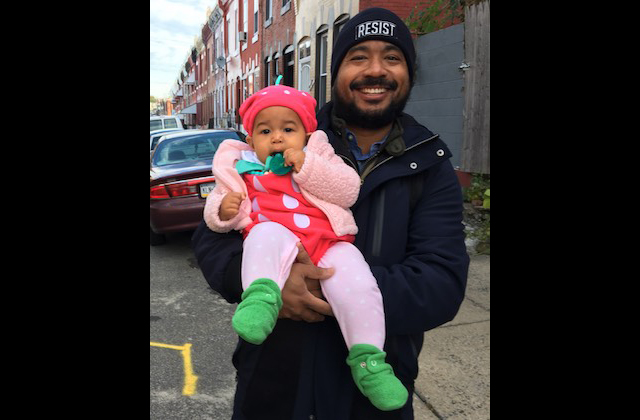Garland McLaurin pushes back against the racist tropes that target Black fathers and their families with his new docuseries, “Pops,” which airs online at PBS’ Storycast platform every Thursday.
The 11-part series follows four Black fathers in three vastly different families as they experience parenthood. La Guardia Cross, the subject of last week’s (October 26) premiere, balances his rap career with being a supportive parent and partner to his daughter Amalah and partner Leah.* Other episodes focus on criminal justice activist Shaka Senghor, who co-parents three-year-old Sekou with his partner Ebony Roberts—all while touring the country to speak about mass incarceration and his own 19 years behind bars. Future episodes highlight Chris and Shelton Stroman-Inniss, who fight against Georgia’s same-sex marriage ban while raising their son, Jonathan.
McLaurin won a 2013 Peabody Award for “180 Days: A Year Inside an American High School," a PBS documentary about students and staff who thrive against the odds at a predominantly Black Washington, D.C. high school. He drew on this exploration of Black children’s support networks, as well as his own recent fatherhood, while shooting the series.
The show’s official website, pops.life, will feature parenting resources to accompany each episode’s themes.
We spoke to McLaurin about developing “Pops,” lessons from its subjects and more. Here, highlights of that conversation, condensed and edited for clarity.
What compelled you to create “Pops” and document Black fatherhood?
I’d already made a few documentaries that looked at Black boys going through the school system, and I was affected by news reports on police-involved shootings. I also was on the cusp of being a first-time father. All of that came together to make me interested in exploring what fatherhood looked like through Black men’s eyes. Black Public Media encouraged me to apply for their incubator program with this project as a web series. The web helps you get your content out into the world faster and avoid the hurdles that go with other broadcast forms. I also wanted to reach people who would be seeing this on phones or other mobile devices.
What led to you featuring these particular family units in "Pops?"
When I developed the show, I was interested in fatherhood for new fathers. I also wanted to investigate fatherhood after incarceration, which is a big deal in the Black community, as well as fatherhood for same-sex couples, which people don’t discuss much. I want these particular themes to be conversation-starters for dads and their families.
The series highlights Black men in different parenting situations, but the first episode with La Guardia Cross also follows his wife, Leah, and her struggles with depression. Why have this inclusion in a series primarily focused on Black fathers?
The series shows that whenever you focus on Black men, you automatically focus on the Black family or other supporting community around raising kids. There’s this narrative that Black dads are deadbeats, and that’s just not true—Black dads are actually more involved in their kids’ lives than any other group. But average people, even some Black people, don’t know that. I wanted to contribute a counter-narrative.
The role of women in raising kids has to be honored and acknowledged. Leah Cross and [the mother of Shaka Senghor’s child] Ebony Roberts are phenomenal women, and very supportive of their kids and the fathers in different ways. Neither La Guardia nor Shaka would be the men they are without their partners.
Is that true for you too? u2028
Oh, absolutely! And you can print that! [laughs] There’s no way I could’ve gotten to where I am without Mari and her support as a partner and mother. It’s amazing to see the connection she has with my daughter—I have a connection with her too, but it’s not the same.
As you said, you’re a new father who was shooting other new fathers as they grew into their roles. Did you learn anything from filming “Pops” that you now take into your own parenting? u2028
Oh man! [laughs] I learned the necessity of keeping an open, healthy dialogue with your loved ones, and how important it is to live your truth. All of these men live their truth and are very good at communicating with their children.
But each father is so different. I really enjoyed watching La Guardia balance his work and dedication to his family. [The best part of watching] Shaka was seeing him trying to provide the best for his child, while also having a healthy co-parenting relationship with his child’s mother. Chis and Shelton went through hell to navigate state and private adoption services to get their child, and they showed a lot of courage in building this community to support their son and themselves. That was very inspirational.
Watch the second episode of “Pops” below, and check out future episodes at pops.life and on YouTube.
*Note: Post has been updated since publication with a correction regarding the second episode’s content.
